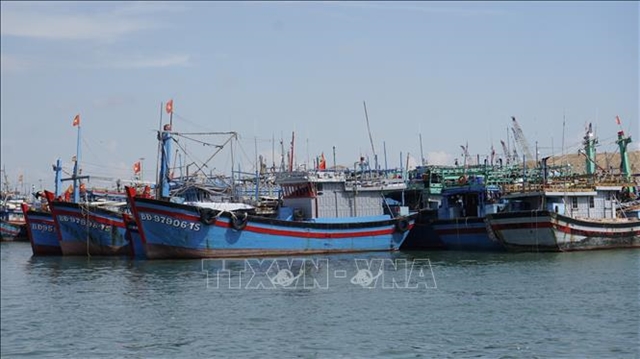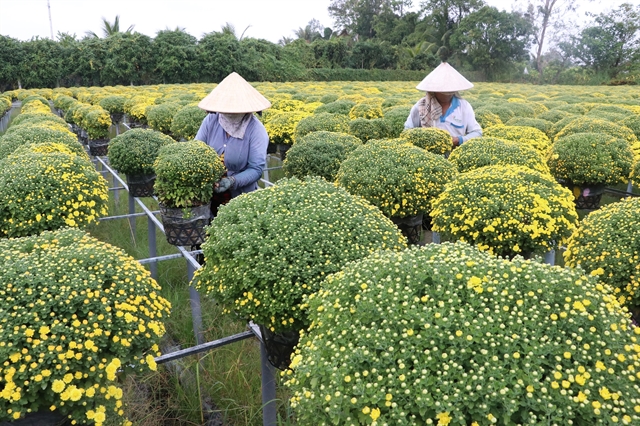 Economy
Economy

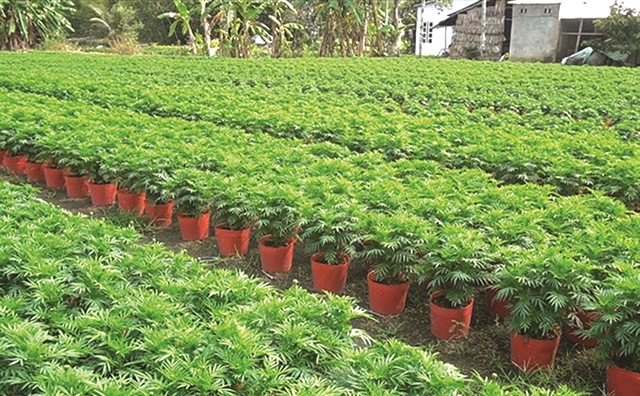 |
| Unseasonal rains cause great damage to flowers grown in the Mekong Delta. VNS Photo Văn Châu |
Many flower farmers in Mekong Delta provinces predict that the Tết (Lunar New Year holiday) flower market will be unpredictable due to many different factors.
A gradually recovering economy, unseasonal heavy rains and high fertiliser prices are the reasons why farmers believe that the flower market in the Tết season, which falls on late January to early February this year, will face many difficulties.
Over the past few days, heavy and prolonged rains have occurred in the delta, and the atypical rain has affected the cultivation of ornamental flowers.
When heavy rain occurs during the growing stage of plants, it can cause them to be crushed, weakened and be susceptible to disease. This not only reduces the quantity and quality of the flowers, but also increases the production costs for gardeners.
Trần Thị Kim Liên, a flower farmer in Cần Thơ City's Bình Thủy District, said that the heavy rains damaged more than 200 of her marigold and chrysanthemum pots.
“Heavy rains crushed the flowers and caused fungal diseases,” she said.
This is the second time her flower garden has been affected by atypical rains, the first time was in early December.
"To reduce damage, I proactively covered the trees with nets to avoid flooding and pests. However, prolonged and frequent heavy rains increased the damage. Not only that, heavy rains caused the temperature to drop, putting hundreds of ochna trees at risk of blooming earlier than expected," she said.
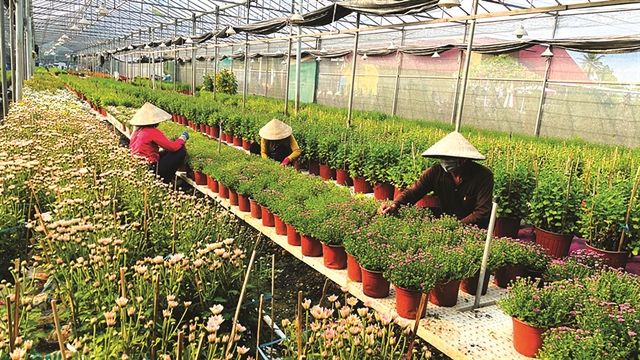 |
| Flower farmers in the Mekong Delta set up temporary rain and sun protection covers to limit the impact of bad weather on plant growth. VNS Photo Văn Châu |
Although it is not yet the peak shopping season, flower prices have shown signs of increasing. According to records, the Tết flower market has somewhat improved, with flower prices increasing from VNĐ5,000 - VNĐ20,000 per pot compared to the same period last year. However, Liên is still worried about lower crop yield and profits.
"The heavy rains have increased the cost of fertiliser, pesticides and trellis for the flower garden, not to mention the death and damage of some plants. The increased production costs mean that sales are not profitable. I estimate that profits will decrease by about 30 per cent compared to last year," Liên said.
Lê Văn Thành, a flower grower in Hậu Giang Province's Vị Thanh City, said that this year he planned to bring to the market about 5,000 pots of various Tết flowers such as chrysanthemums, daisies, marigolds, and roses.
More than 80 per cent of these flower pots have been reserved by traders. However, bad weather has damaged about 700 pots, Thành said. He had to increase cultivation by about 1,500 pots to anticipate the flowers being damaged by further rain.
According to the Bình Thủy District's Agricultural Extension Centre, the number of ornamental flowers planted for the 2025 Tết season is expected to reach over 200,000 pots. The purchase of flowers this year may increase by 5-8 per cent compared to last year.
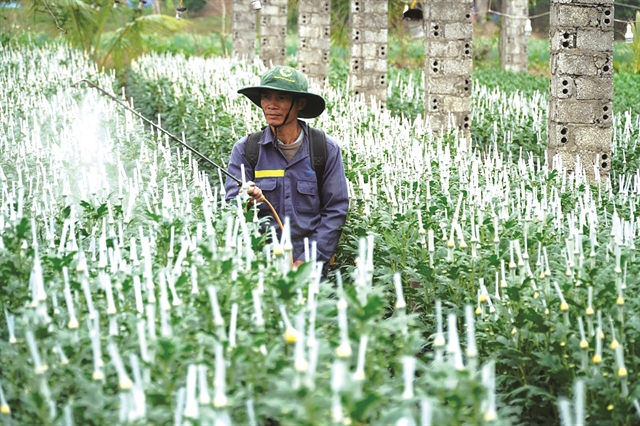 |
| A farmer sprays pesticide to increase resistance for Tết flowers. VNS Photo Văn Châu |
Local agricultural experts recommend that, due to the impact of storms, rains, and erratic heat, flower growers need to regularly monitor and promptly respond to adverse changed weather.
Accordingly, gardeners need to equip temporary rain and sun protection covers to limit the impact of weather on plant growth, increase organic fertiliser use to help plants have good resistance, limit pests and diseases, improve irrigation systems and clear water flows to limit damage caused by flooding.
In order to help farmers grasp techniques and market trends, in the coming time the agricultural authority of Hậu Giang Province will continue to conduct training sessions, share experience, and organise many activities to support farmers to stabilise their cultivation of Tết flowers.
Traders reduce deposits
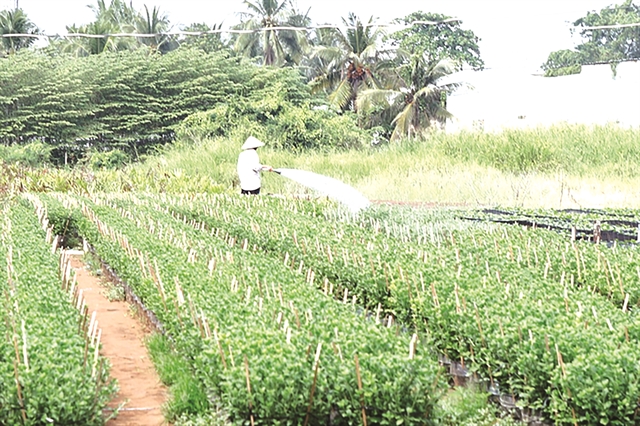 |
| Traders reduce Tết flower deposits due to concerns about a gloomy market. VNS Photo Văn Châu |
Although the number of flowers ordered by traders has doubled compared to last year, the amount they deposit is only 10-25 per cent of the total value of the flowers.
Trần Văn Nhành in Hậu Giang's Châu Thành A District was excited when traders placed early orders, doubling the quantity compared to last year.
Nhành has planted nearly 8,000 pots of marigolds, chrysanthemums, bougainvillea and ornamental almonds. Of these, 5,000 pots have been ordered by traders in advance, and the rest he will sell retail.
However, the amount of deposit paid by traders is only 15 per cent of the total value of the flowers. If the flower market is bad and purchasing power is weak, traders will accept losing the deposit and cancel the order, according to Nhành.
Similarly, Phạm Văn Mĩ, in Đồng Tháp Province's Sa Đéc City, said that in early December, traders ordered more than 6,000 pots of Tết flowers of various kinds from him. However, they only paid a deposit of VNĐ50 million (US$2,400), which was only 25 per cent of the total value of the flowers, 10 per cent lower than previous years.
Traders have recently continued to contact him to order 2,000 more flower pots, but he still did not agree because of the low deposit and unusual weather conditions.
Unfavourable weather has made Tết flower growing difficult. Many gardeners have used deposits from traders to build greenhouses, and buy fertilisers and medicines to care for and protect ornamental plants.
For high-value plants like ochna, to avoid the risk of having orders cancelled, Trần Văn Mận in Hậu Giang's Vị Thanh City requires traders to deposit half of the tree's value.
His 40 ochna trees have current prices ranging from VNĐ3-VNĐ80 million, depending on size and shape.
According to a report by the agricultural authority, farmers in Châu Thành A District have planted a total of 217,250 pots of various kinds of flowers to supply the market for the coming Lunar New Year.
Diversify sales channels
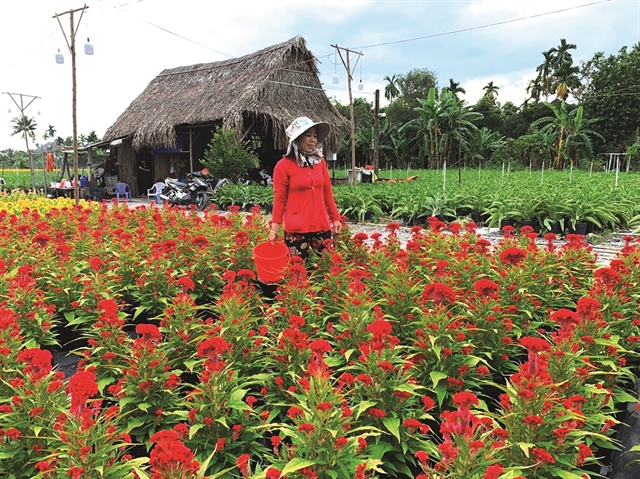 |
| Farmers combine online and traditional flower sales to diversify sales channels. VNS Photo Văn Châu |
Farmers in Mekong Delta provinces have diversified flower sales channels in order to reduce dependence on traders' purchase.
To expand the market and reduce the cost of renting premises and transport, some gardeners are doing multi-channel businesses, combining direct sales and e-commerce platforms.
“Last year, one-fourth of my flower pots were sold online. The sales volume was not high, but there was no need for sales premises and traders, and the profit from the goods sold was almost equal to the profit from the number of flowers sold through traditional channels,” Trần Văn Kiên, a farmer in Kiên Giang, said.
According to Kiên, the advantage of selling online helps to reduce significantly costs of premises and labour, and expand the market. However, he still keeps the traditional way of trading.
“Online sales channels only sell mid- and low-priced flowers. Demanding customers still want to choose high-value ornamental plants such as ochna blossoms and bougainvillea directly on the spot.” VNS

